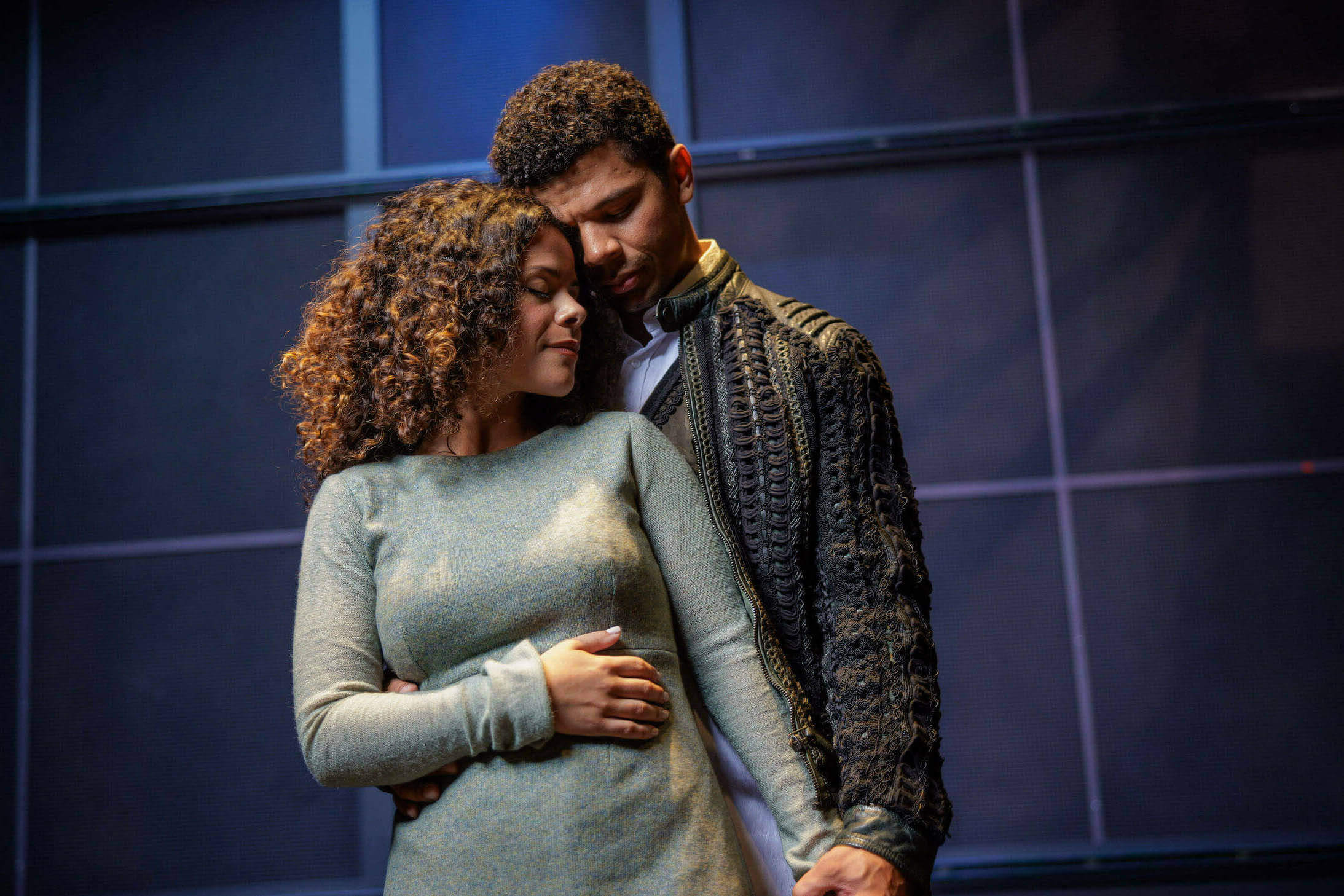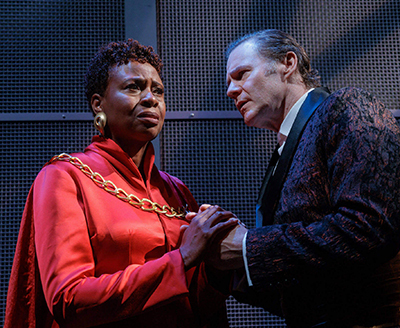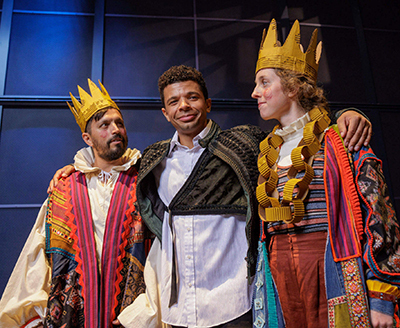Shakespeare at Notre Dame to present ‘Hamlet 50/50,’ a new gender-balanced adaptation of the play

“To be or not to be — that is the question.” It’s one of Shakespeare’s most famous lines and begins Hamlet’s most-anticipated soliloquy in Act 3 of the play.
But, Shakespeare at Notre Dame’s latest production is asking a new question: What if it’s not Hamlet who makes that speech?
This week, the Notre Dame Shakespeare Festival Professional Company will debut “Hamlet 50/50,” a world-premiere adaptation of the play focused on creating a more gender-balanced and equitable production model. “Hamlet 50/50” will be performed in the Patricia George Decio Theatre in the University’s DeBartolo Performing Arts Center from Aug. 17 to 27, with reduced-price preview performances on Tuesday (Aug. 15) and Wednesday (Aug. 16). Tickets are available online or in person at the box office.
The production — adapted by Vanessa Morosco and Peter Simon Hilton, founders of the 50/50 Shakespeare Project — will have dialogue evenly shared between male and female characters, in contrast to the original script of “Hamlet,” in which only 8.5 percent of the lines are spoken by female characters.
Morosco and Hilton, who have spent 30 years as practitioners of Shakespeare, said the inequity they’ve encountered in Shakespeare’s works made sense in his day because he didn’t live long enough to see a time where it was legal for women to perform on stage.
“He wrote exclusively for male practitioners,” said Morosco, who is also directing the production. “Most of his female characters were written for the young boys in his company. Today, that means that if we cast exclusively on gender-normative lines, women professionals are only permitted to play roles that are essentially written for what we would term an apprentice.
“That makes it a really challenging workplace in which to find equity and to have equitable access to creativity. We thought we should be better than that.”
Peter Holland, the McMeel Family Chair in Shakespeare Studies, who consulted on the adaptation of the script, acknowledges that some people may be concerned about changing such a classic work. However, he emphasized that the arc of the action is the same, and the great speeches are still there — even if they may be spoken by a different character.
“There are always people who think, ‘How dare you do these things to the Bard?’” Holland said. “But I say, if we don’t continue to remake Shakespeare, there’s no point in doing Shakespeare. The only Shakespeare I know I dislike is boring Shakespeare.
“Is this how the play should always be done? No. But is this an experiment worth trying? Absolutely. This says that if we’re really going to rethink what we mean by equity in the Shakespeare workplace, we can’t do it by just casting women in roles that are really men’s roles. We need to think it through and make sure it’s equitable for the cast, the crew, for everyone.”

To adapt the text, Morosco and Hilton went line by line, considering what events are happening, who is moving the plot forward and what changes might result from giving female-identifying characters additional lines — and, through that, additional agency.
That included the famed “To be or not to be” soliloquy, which will be performed by Ophelia.
“It’s a speech that has been lauded among those who love and produce Shakespeare, and it has the reputation of being a universal speech that applies to all humanity,” Morosco said. “So we thought, well then, couldn’t more people than Hamlet say it? And as we thought about the course of the play and which character is asking really hard questions, particularly about existence and mental health — it’s Ophelia. Being able to give voice to that is really exciting.”
In some ways, the speech itself becomes more powerful through that change, Hilton said. “It’s heartbreaking because when she says it, it’s quite different from the philosophical musings of Hamlet. It means so much more.”
Notre Dame is an ideal place to be premiering this new work, Holland said, and to engage with the issues it addresses in an academic setting.
“Being a part of a university means we can be experimental. We can use our scholarship. We can help people think about these things in a way that other theaters may not,” he said. “Notre Dame is a place where we should confront change and difficult material, and we do that all the time. It’s a place where we can advance these issues — and that’s what makes us better today.”

To that end, Holland and Scott Jackson, the Mary Irene Ryan Family Executive Director of Shakespeare at Notre Dame, hope to continue to engage with the audience — and Notre Dame students, in particular — about issues of equity and inclusion at a series of pre- and post-show discussions, as well as at other events throughout the upcoming academic year.
Two post-show talkbacks featuring Q&As with the cast and crew will take place on Aug. 18 and Aug. 25, and three pre-show “orientation” sessions with Holland and Morosco will be held on Aug. 19, Aug. 23 and Aug. 26.
Jackson said this production is also part of a larger vision at Shakespeare at Notre Dame to create an inclusive space where practitioners can work in partnership with Shakespeare and bring him into the 21st century.
“We believe representation matters on stage,” Jackson said. “And we’re very conscious of who is being given these opportunities and what that represents in terms of our core values. If we can work with a more diverse pool of actors that better represent our communities, we know they are going to tell the story from their own lived experiences, and that’s going to bring something vital and very contemporary to Shakespeare.
“For me, it’s all about helping the students and the audience to understand that Shakespeare is ours, and that it’s OK to take risks with his work. The element of risk is what creates great art and what will foster deeper ongoing conversations. And that’s the best thing we can do to keep Shakespeare relevant.”
Latest Colleges & Schools
- Faculty receive prestigious early career awards from National Science FoundationDuring the 2024-25 academic year, four researchers in the University of Notre Dame’s Colleges of Engineering and Science received early-career awards from the National Science Foundation.
- ‘Prebunking’ false election claims may boost trust in electionsIn recent years, democracies worldwide have seen a growing erosion of trust in election outcomes and institutions, driven in part by fears of widespread fraud. New Notre Dame research finds that “prebunking” — providing accurate information before false claims spread — boosts trust in elections more effectively than traditional fact-checking.
- Justice Amy Coney Barrett to deliver Center for Citizenship and Constitutional Government lectureAmy Coney Barrett, associate justice of the Supreme Court of the United States, will speak at the University of Notre Dame at 4 p.m. Sept. 12 in the Leighton Concert Hall of the DeBartolo Performing Arts Center.
- Three Notre Dame researchers win NEH grants for humanities-based projectsDavid Hernandez, the Eli J. and Helen Shaheen Associate Professor of Classics, and Morgan Munsen, senior research and partnerships program manager at the Nanovic Institute for European Studies in the Keough School of Global Affairs, have each won an NEH Collaborative Research grant. Thomas A. Stapleford, associate professor in the Program of Liberal Studies, is leading a team that has been awarded a Humanities Research Center on Artificial Intelligence grant.
- Open-access database offers insights into U.S. congressional candidatesEach election cycle, thousands of candidates vie for seats in the U.S. House of Representatives and the Senate. Until now, there has been no comprehensive, publicly available resource cataloging what those candidates say about who they are or what they stand for. A new open-access database called CampaignView, created by researchers at the University of Notre Dame, offers researchers, journalists and educators a powerful tool to understand congressional elections.
- First impressions count: How babies are talked about during ultrasounds impacts parent perceptions, caregiving relationshipPsychologist Kaylin Hill studied the impact of a parent’s first impression of their baby during an ultrasound exam. The words used by the medical professional to describe the baby (positive or negative) influence how the parents perceive their baby, relate to them after they're born and even how that child behaves as a toddler. The research has broad implications for how we train medical professionals to interact with expectant parents, as well as how we care for parents during the perinatal period when they are most susceptible to depression.













